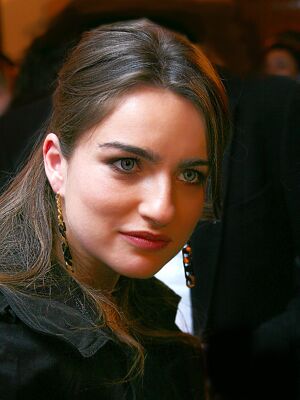President of Volyna: Difference between revisions
No edit summary |
|||
| Line 33: | Line 33: | ||
==Election== | ==Election== | ||
Since the referendum on the direct election of the president of the Volynian Republic in 1962, the officeholder has been directly elected by universal suffrage; they were previously elected by an electoral college. After the referendum in 2000 on the reduction of the mandate of the president of the Volynian Republic, the length of the term was reduced to five years from the previous seven; the first election to a shorter term was held in 2002. President Vita Serdyuk was first elected in 1995 and again in 2002. At that time there was no limit on the number of terms, so Serdyuk could have run again, but chose not to. She was succeeded by Feodosij Shcherbyna on 16 May 2007. Following a further change, the constitutional law of 2008 on the modernisation of the institutions of the Third Republic, a president cannot serve more than two consecutive terms. Borys Soroka and Vita Serdyuk are the only presidents to date who have served a full two terms (14 years for the former, 12 years for the latter). In order to be admitted as an official candidate, potential candidates must receive signed nominations from more than 500 elected local officials, mostly mayors. These officials must be from at least 10 ''Voivodeships'', and no more than 10% of them should be from the same ''Voivodeship''. Furthermore, each official may nominate only one candidate. Spending and financing of campaigns and political parties are highly regulated. There is a cap on spending (at approximately ₴20 million) and government public financing of 50% of spending if the candidate scores more than 5%. If the candidate receives less than 5% of the vote, the government funds ₴8,000,000 to the party (₴4,000,000 paid in advance). Advertising on TV is forbidden, but official time is given to candidates on public TV. An independent agency regulates election and party financing. Volynian presidential elections are conducted using run-off voting, which ensures that the elected president always obtains a majority: if no candidate receives a majority of votes in the first round of voting, the two highest-scoring candidates arrive at a run-off. After a new president is elected, they go through a solemn investiture ceremony called a передача повноважень ("handing over of powers"). | |||
Revision as of 20:41, 11 March 2022
| President of the Volynian Republic | |
|---|---|
| Президент Волинської Республіки | |
| Executive branch of the Volynian Government | |
| Style | Ms President (informal) Her Excellency (diplomatic) |
| Status | |
| Member of |
|
| Residence | Boda Palace |
| Seat | Lutsk, Volyna |
| Appointer | Popular vote |
| Term length | Five years, renewable once |
| Constituting instrument | Third Republic Constitution |
| Inaugural holder | Roman Babenko |
| Formation |
|
The president of Volyna, officially the President of the Volynian Republic (Volynian: Президент Волинської Республіки), is the head of state of Volyna, as well as the commander-in-chief of the Volynian Armed Forces. As the presidency is the supreme magistracy of the country, the officeholder is the holder of the highest office in Volyna. The powers, functions and duties of prior presidential offices, in addition to their relation with the prime minister and Government of Volyna, have over time differed with the various constitutional documents since the Second Republic. The current president of the Volynian Republic is Kseniya Taranenko, who succeeded Anatolij Tkachuk on 14 May 2017.
Election
Since the referendum on the direct election of the president of the Volynian Republic in 1962, the officeholder has been directly elected by universal suffrage; they were previously elected by an electoral college. After the referendum in 2000 on the reduction of the mandate of the president of the Volynian Republic, the length of the term was reduced to five years from the previous seven; the first election to a shorter term was held in 2002. President Vita Serdyuk was first elected in 1995 and again in 2002. At that time there was no limit on the number of terms, so Serdyuk could have run again, but chose not to. She was succeeded by Feodosij Shcherbyna on 16 May 2007. Following a further change, the constitutional law of 2008 on the modernisation of the institutions of the Third Republic, a president cannot serve more than two consecutive terms. Borys Soroka and Vita Serdyuk are the only presidents to date who have served a full two terms (14 years for the former, 12 years for the latter). In order to be admitted as an official candidate, potential candidates must receive signed nominations from more than 500 elected local officials, mostly mayors. These officials must be from at least 10 Voivodeships, and no more than 10% of them should be from the same Voivodeship. Furthermore, each official may nominate only one candidate. Spending and financing of campaigns and political parties are highly regulated. There is a cap on spending (at approximately ₴20 million) and government public financing of 50% of spending if the candidate scores more than 5%. If the candidate receives less than 5% of the vote, the government funds ₴8,000,000 to the party (₴4,000,000 paid in advance). Advertising on TV is forbidden, but official time is given to candidates on public TV. An independent agency regulates election and party financing. Volynian presidential elections are conducted using run-off voting, which ensures that the elected president always obtains a majority: if no candidate receives a majority of votes in the first round of voting, the two highest-scoring candidates arrive at a run-off. After a new president is elected, they go through a solemn investiture ceremony called a передача повноважень ("handing over of powers").
